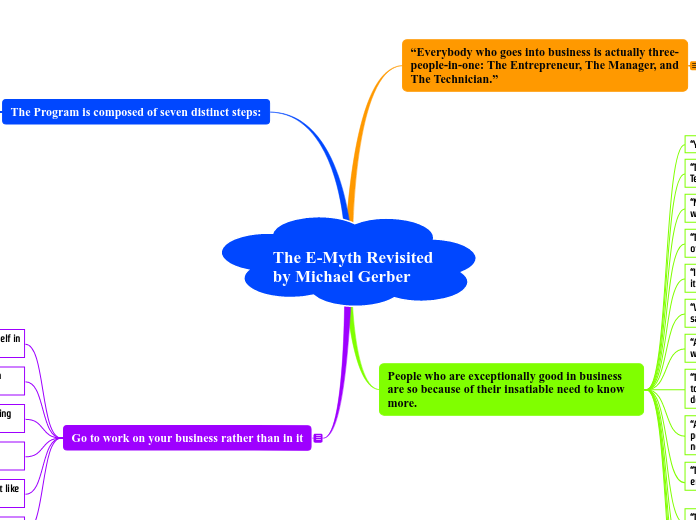The E-Myth Revisited
by Michael Gerber
“Everybody who goes into business is actually three-people-in-one: The Entrepreneur, The Manager, and The Technician.”
The Entrepreneur
The Manager
The Technician
People who are exceptionally good in business are so because of their insatiable need to know more.
“Your business is not your life.”
“The fact of the matter is that we all have an Entrepreneur, Manager, and Technician inside us.”
“Most businesses are operated according to what the owner wants as opposed to what the business needs.”
“The purpose of going into business is to get free of a job so you can create jobs for other people.”
“If your business depends on you, you don’t own a business—you have a job. And it’s the worst job in the world because you’re working for a lunatic!”
“What you do in your model is not nearly as important as doing what you do the same way, each and every time.”
“A Mature business knows how it got to be where it is, and what it must do to get where it wants to go.”
“The Entrepreneurial Model has less to do with what’s done in a business and more to do with how it’s done. The commodity isn’t what’s important—the way it’s delivered is.”
“A Mature company is founded on a broader perspective, an entrepreneurial perspective, a more intelligent point of view. About building a business that works not because of you but without you.”
“There’s a critical moment in every business when the owner hires his very first employee to do the work he doesn’t know how to do himself or doesn’t want to do.”
“The typical small business owner is only 10 percent Entrepreneur, 20 percent Manager, and 70 percent Technician.”
“Pretend that the business you own—or want to own—is the prototype, or will be the prototype, for 5,000 more just like it.”
“Documentation says, ‘This is how we do it here.’”
“Your job is to prepare yourself and your business for growth.
“The three phases of a business’s growth: Infancy, Adolescence, and Maturity.”
The Program is composed of seven distinct steps:
Your Primary Aim
Your Strategic Objective
Your Organizational Strategy
Your Management Strategy
Your People Strategy
Your Marketing Strategy
Your Systems Strategy
Go to work on your business rather than in it
Innovation is the mechanism through which your business identifies itself in the mind of your customer and establishes its individuality.
Quantification: the numbers related to the impact an Innovation makes.
“Orchestration is the elimination of discretion, or choice, at the operating level of your business.”
“Once you’ve innovated, quantified, and orchestrated something in your business, you must continue to innovate, quantify, and orchestrate it.”
“Think of your business as though it were the prototype for 5,000 more just like it.”
“Your Business Development Program is the vehicle through which you can create your Franchise Prototype.”
